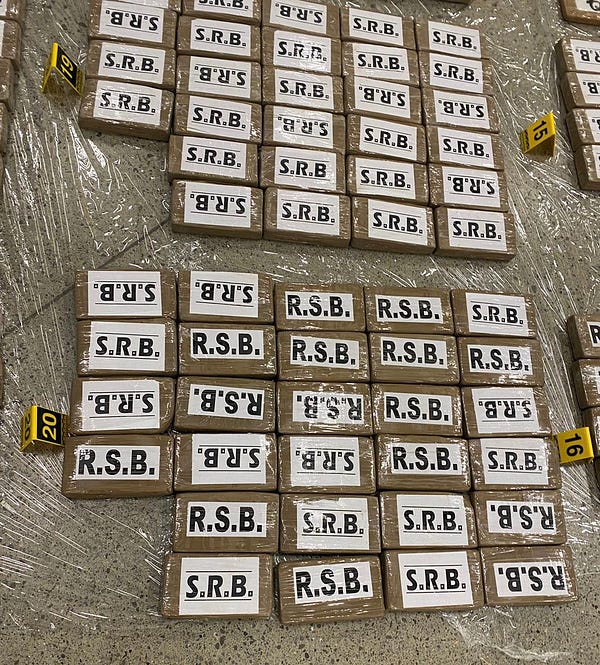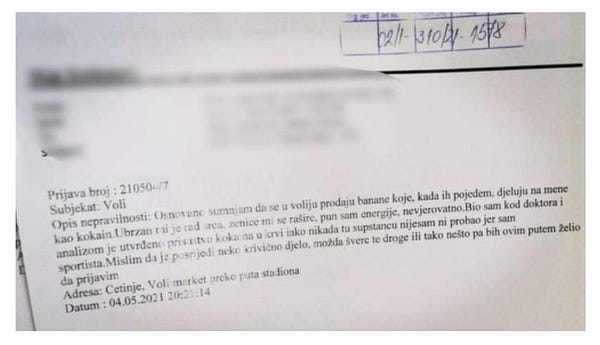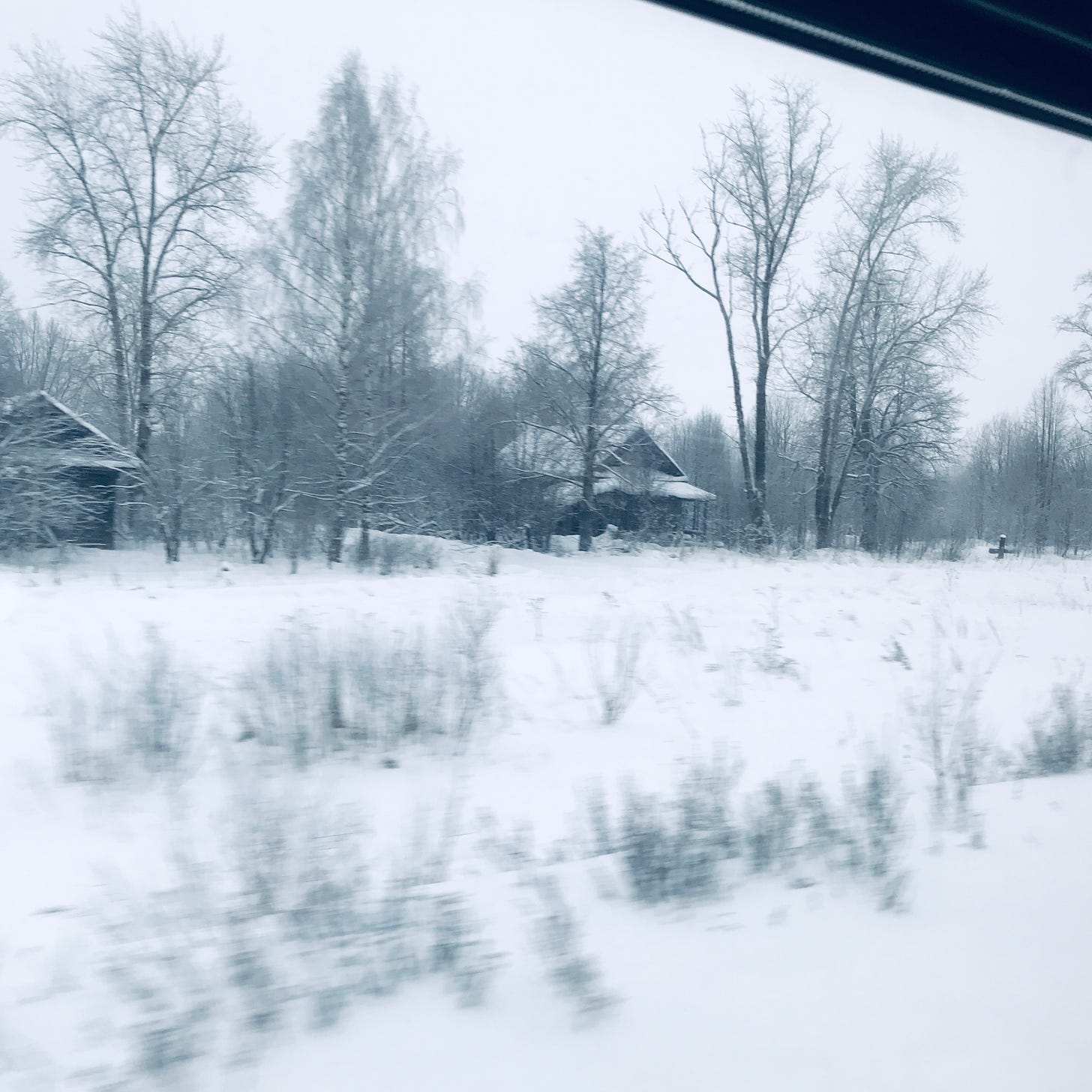Winter mud and other thoughts
Genuinely scared and sad over U.S-Russia state of affairs. Plus cocaine bananas in Montenegro, Kazakhstan, Bosnia, and kids & Omicron.
The U.S. and Russia penciled in a week of talks this week and the world breathed a collective sigh of relief. But yesterday’s NATO-Russia meetings and the rhetoric shared with the press afterwards left me more concerned than ever that we are only a few orders away from a ground war in Europe. Although I’ve been saying for a long time now that Putin’s pet project/obsession with Ukraine is real, I didn’t want to believe that he would really send in thousands of boots on the ground. I still don’t want to believe it, because it’s so absurd it would make earlier generations of Soviet citizens roll in their graves.
I was listening to this yesterday as I was walking over the Kennedy bridge in Vienna’s 13th district, and stopped in my tracks entirely.
The mud, the journalist explained. The what, I thought? The mud, he said, only really freezes in Ukraine in February and March. You have a two month window, he elaborated, to move in tanks and heavy equipment.
How in 2022 is mud determining the fate of Europe? Is this real? Would any invasion of Ukraine not involve airplanes and few bombings of Kiev and the Ukrainians surrender and you avoid thousands of dead young Russians and Ukrainians who have no business shooting at each other in the first place? How do defense budgets run into the billions upon trillions and it comes down to MUD?

Of course this whole mess started because of Putin. No doubt about it. But what I cannot understand is the U.S. is taking the bait, upping the states, pouring fuel on the fire. Biden has a team of advisors who are not Russia-neutral, to put it nicely. The U.S. is proposing sanctions that while they won’t deter Russia from doing anything (see Putin’s obsession with Ukraine), will certainly be viewed in Moscow as a semi-declaration of war. Meanwhile, everyone in DC knows exactly the Russian people have zero say in this whole situation. They don’t elect their leader. They don’t want war. America should be calmly trying to talk the old man down. Instead it feels like we turned the clock back to the Cold War and suddenly it got very hot.


Meanwhile, gas supplies in Europe are…surprise, surprise…now very low and Europe is very quiet about the whole situation. Sometimes it feels like Europe is a passenger, a passive participant, somehow disinterested in its own fate. But if war breaks out, it will be here, only hundreds of miles from Vienna. The folks sitting in Washington DC will be warm and won’t worry about gas or war or any of those uncomfortable things they will read about on their iPhone screens.


Many experts have said no one knows what Putin will do, and that may be true. But there was an opportunity here for the U.S., since it willingly stepped into that role, to be the adult, the big brother, to pull aside the Russians and say, we hear you, we hear your concerns, we don’t share them, but we are willing to listen. Instead these talks feel like something put on for entertainment and the international media while behind the scenes both sides are preparing for the worst case scenario. Russia goes to war with Ukraine (unthinkable to anyone you would have spoken with circa 2000) and the U.S. puts together its mega-sanctions package although the Russian people don’t decide anything anyway so all you do is prove Putin’s point on state TV that the west hates Russia and is out to get it. Bravo, pundits. This is why you need real world exchanges between countries and not just Twitter diplomacy.
So I’m sad and scared.
Banana cocaine in Montenegro
In lighter news, I follow some Montenegrin official accounts on Twitter (as one does), and was surprised when this photo showed up on my feed. Montenegrin politicians proudly post photos of local drug busts, which is really funny when a lot of your economy is a pretty open secret narco state, and only sometimes drugs are miraculously “found” when a show of action is needed for political purposes.


But what was even more amusing was what followed. The drugs were seized yesterday hidden in banana boxes. Now it turns out a customer of Voli (a chain of local supermarkets familiar to anyone who has holidayed in beautiful Montenegro) wrote to the company last May complaining he felt funny after eating bananas and could they possibly have been exposed to cocaine?! At the time, as you’ll see below, he was laughed at. Plus, 400 kilos?! How the hell do you hide 400 kilos? Everyone working there must have known.


Kazakhstan — the dust begins to settle
The dust is beginning to settle in Kazakhstan and stories are emerging of the new government beginning what looks like a systematic reevaluation of the role of the Nazarbayev clan in the country’s economy. Probably far too early to draw any lasting conclusions, but this article is very thorough and a wonderful explainer as to how things look at the moment.


Pro-Kremlin voices within Russia spent some time yesterday attacking Kazakhstan’s new information minister, calling him a Russophobe, which was a bit strange but probably means there are disagreements within Moscow as to how best to manage the Kazakh situation. As far as I understand, Russian troops are still on the ground as part of the CSTO operation, but will leave “soon”. I would still expect Russia to squeeze out some significant commercial concessions for literally saving the tail of the current Kazakh government earlier this month.
Bosnia — the problems aren’t going away no matter how long Europe ignores them
Earlier this month, the Serbian-majority Republika Srpska led by Dodik, who imho takes his orders from Belgrade and Moscow due to the sad economic state of his half of an already economically depressed country, put on a terrible public show of the worst of Serbian nationalism and genocide-denial. You probably saw the horrible videos and photos on Twitter. We all did.
Europe was again fairly quiet. Europe likes to pretend that if it doesn’t comment on Bosnia, the problems down south will simply disappear. The thing is, Bosnia and its people aren’t going anywhere. And although it is really unfair to say Bosnia is Europe’s problem to fix, because at some point the Balkans have to start fixing themselves, and not always looking to EU for help. But until the Balkans become capable of fixing their own problems, their problems are Europe’s problems by virtue of geographic proximity if not moral compass.
This piece is an excellent overview of the current situation.


As long as the west ignores Bosnia, other countries, namely Russia, Serbia, and Orban’s Hungary, know exactly what they are doing. Not because they care at all about the fate of the Bosnian people (they don’t), but rather to disrupt the current order of things for the EU. The U.S. has all sorts of characters, ex-CIA etc. now running around the Balkans, which personally doesn’t make me feel any better about the prospects for lasting, better solutions. One thing I know for certain: you can ignore the problems in the Balkans for a long time, but one day, suddenly, as if out of nowhere, they will become all of our problems.
Omicron, kids, school. Going into 2022 with a better understanding of where we are.
I found this interview with Dr. Paul Offit to be super informative as to the actual clinical picture of what doctors in the U.S. are seeing right now with Omicron patients. He talks a lot about kids, schools, and what can and can’t be done right now. He is absolutely clear that the next 4-6 weeks will be bad.
I’ve tweeted about it and gotten some pushback, which I completely understand from people with kids under 5. For that age group, there are simply no good answers. But for the rest of us, vaccinated as much as we can be, the clinical picture with Omicron looks much better than it did with Delta and earlier versions of covid.
Which brings me to one final thought. I realised recently the experts whose opinions and views I value the most are those who over the past two years have been able to look back and reflect, to say what we got right and what we got wrong, to identify what has now changed, to understand that today’s pandemic is not March 2020, and the public policy implications of that realisation.

I do think a lot of science people with large followings have positioned themselves in different parts of the covid spectrum, from super cautious to let it rip, and I don’t see much evidence of them moving out of their corners, even as new data rolls in and evidence changes. That makes me think many are searching out data that matches what they want to say. Namely, what they believe made them popular or media darlings or whatever in the first place. In any case, worrying. The best experts must be those who have changed their minds along the way, who give advice based on what they are seeing in the actual most recent data, in the real world, not simply repeating what their particular covid audience wants to hear.
Just like the virus changes, so should our response to it.
Happy Thursday everyone. Thanks for reading.




